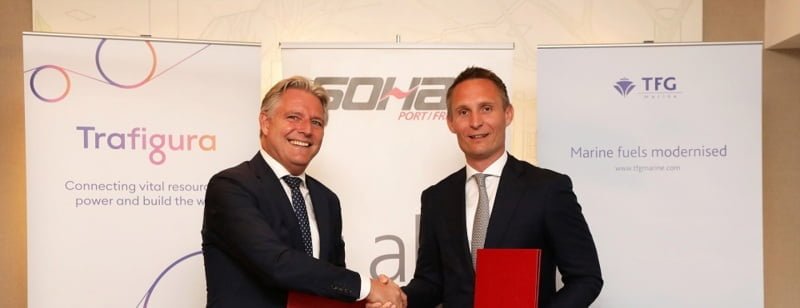During the International Energy Week in London, SOHAR Port and Freezone and TFG Marine sealed a significant Memorandum of Understanding (MoU) to establish an international bunker fuel supply operation within the deep-sea port. This collaboration aims to enhance the port’s strategic positioning and facilitate efficient fueling services for vessels traversing major shipping routes connecting the Gulf and the Indian subcontinent with the rest of the world.
Commenting on this agreement, Emile Hoogsteden, CEO of SOHAR Port said, “Today’s agreement reconfirms SOHAR Port’s commitment to build a digitalized and transparent bunker operation that meets international standards already introduced in Singapore and soon to be implemented in Rotterdam. This will enable TFG Marine to establish an international bunker fuel supply operation at SOHAR Port and to offer all grades of bunker fuel to vessels.”
Situated conveniently in the city of Sohar, Sultanate of Oman, the port boasts anchorage areas within 4 to 10 nautical miles offshore, with depths ranging from 30 to 60 meters. Annually, over 3,000 vessels of various sizes frequent the port, a number expected to rise with the introduction of TFG Marine’s bunker fuel supply operation.
“This is an ideal location for TFG to establish its first bunker fuel supply operation in the Middle East,” said Kenneth Dam, TFG Marine’s Global Head of Bunkering. “With the intention to emulate Singapore’s best in class approach there is the potential for SOHAR Port to quickly become a major new physical bunkering procurement location in the Middle East for the world’s shipping fleet.”
TFG Marine plans to initiate deliveries through a local operating company, with the first bunker vessel scheduled to arrive at SOHAR Port in the forthcoming months. Notably, the vessel will be equipped with a Mass Flow Meter (MFM) calibrated to the ISO 22192 international standard, in compliance with SOHAR Port regulations. TFG Marine’s advocacy for calibrated MFMs underscores its commitment to transparency and digitalization in the bunkering sector, aligning with the shipping industry’s decarbonization objectives.

Emile Hoogsteden, CEO of SOHAR Port and Kenneth Dam, Global Head of Bunkering for TFG Marine signing the MoU agreement during International Energy Week in London.
About SOHAR Port and Freezone
As one of the fastest-growing ports in the world, SOHAR Port and Freezone continues to leverage on its strategic location and enhance its services, positioning itself as a key logistics hub within the region and across the world boasting container, liquids, and bulk terminals. A powerful combination of the expertise of the Port of Rotterdam and ASYAD Group, it is earmarked as one of the Sultanate’s mega-projects, home to logistics, petrochemicals, and metal clusters, as well as the region’s first dedicated agri terminal.
Today, after 20 years of operation, it serves as the main gateway for import and export in Oman, directly contributing 2.1% of the country’s GDP and almost 26,000 direct and indirect employment opportunities. With a focus on sustainable development and cutting-edge technology, it is leading the development and modernization of the Sultanate’s logistics infrastructure and supporting the economic diversification objectives of Oman’s 2040 Vision.
About TFG Marine
TFG Marine is a leading international marine fuel supply and procurement joint venture between physical commodity trading company Trafigura Group Pte and shipowning companies Frontline Ltd and Golden Ocean Group Ltd. Formed in 2020, the company provides modern, simplified and transparent services that bridge every stage of the bunkering process for its customers, supplying over 10 million metric tonnes of marine fuels per annum across 35 strategic bunkering hub locations globally.
A recent whitepaper sponsored by TFG and other key stakeholders recognises the success of Singapore’s MFM-based bunker licensing system and proposes this as a template for regulators in other regions across the world, promoting transparency and encouraging digitalisation in the long-term interests of the bunker industry and helping to further the decarbonisation goals of the shipping industry.
Source TFG Marine

